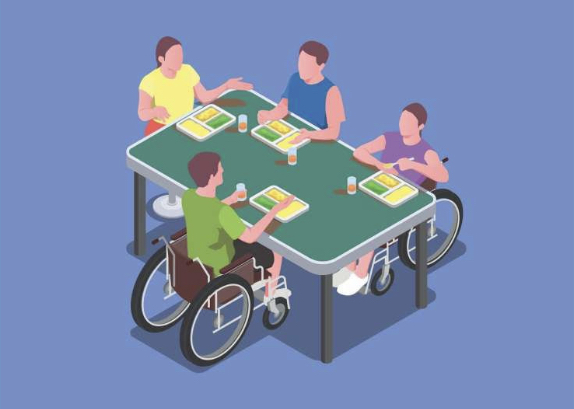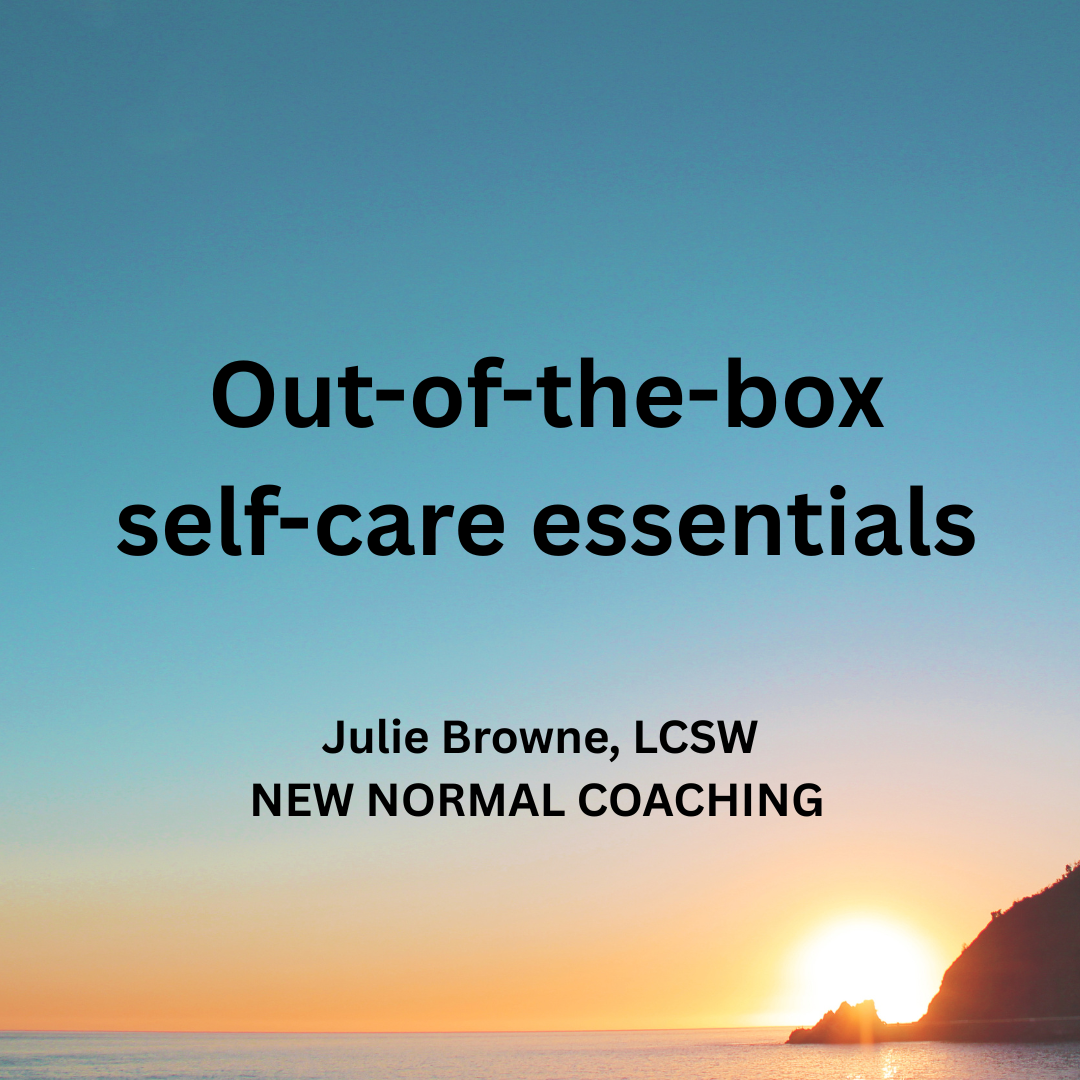Why give kids with learning disabilities help with emotional literacy?

Emotional literacy—(the ability to understand, express and manage your own feelings and be aware of other people's emotional needs) is becoming a more recognized and sought after skill.
The article (link below) describes a small study that focused its impact on kids with special needs because:
"Emotional literacy development in children with learning disabilities is often overlooked, in research and in the development of programs, despite evidence to show that it is protective of a wide range of negative outcomes and leads to better mental health and quality of life. In fact, there is as yet no research that tells us that emotional literacy programs for children in special schools 'work.'”
Does your child’s school teach emotional literacy?
—Julie
Out-of-the-box self-care essentials

Here’s an unsurprising and seriously underutilized basic concept I share with people I coach.
These are people whose world turned upside down after a catastrophic medical diagnosis.
The concept is about prioritizing self-care.
- Because you're pushed into a forced identity transition and you have to DO and BE different, self-care sets you up for this monumental journey.
Apart from taking on new and unexpected responsibilities that disrupt your normal routines you’re also grieving.
You’ve lost the dream of how your life was going to be.
Among other changes it’s injected fear, uncertainty, and possibly robbing you of hope.
Here are three ways to promote self-care under these circumstances:
— Measure productivity differently.
— Get support.
— Process grief.
Learn to give yourself slack around what’s actually possible to get done, now your life’s fundamentally different.
This means letting go without guilt.
- Your reality has changed so too, your expectations and standards a ...
When your world’s turned upside down solve for today

Here’s a basic concept I share with people I coach and is applicable to anyone after their world’s turned upside down.
- When your world turns upside down you’re pushed into a forced identity transition. Here, your job is to create new options.
Now that life isn’t as it was and you can’t BE and DO like before, you’re in a liminal space—you’re neither here nor there.
You’re asking profound questions about:
- Who you are now.
- Who you CAN EVEN be.
And
- Who you WANT to become.
You’re asking these questions because life is now forever different.
And to become the new version of yourself you need to create new options.
- You do this by exploring, discovering, and testing new options.
As you cobble yourself back together.
As you fit yourself into your new normal.
Three principles can help you create new options under these circumstances:
1. Problem-solve for today not tomorrow.
2. Give extra attention and value to intuition.
3. Have lots of conversations.
For parents...
We’re defined by how we handle challenge

Most of the time I see this concept worded differently.
People are trying to “overcome” their challenges.
For me, that puts a negative spin on it.
It implies winning a fight — an act of exclusion.
It makes it seem as if challenge is something to avoid or put behind us.
This perspective holds us back from exploring and experiencing life in its fullest.
- While the word “overcome” carries a sense of satisfaction and accomplishment, it also implies endings.
Life has chapters and episodes and events that end. But only in a sense.
Because if we’re learning from adversity then we’re growing.
Each “ending” becomes integrated into who we are.
- Challenges add wisdom and intelligence to our quivers, making us more capable when the next one is upon us.
So I prefer to talk of handling challenge.
This word allows for embracing something we might prefer to not deal with.
- It’s through embracing not resisting that we can integrate reality into ourselves.
We allow ourselves to be...
Who AM I Now??!

When a child gets a catastrophic medical diagnosis the parent’s identity gets disrupted.
It’s no longer anchored in the same well-defined groups and associations as before.
- Because caregiver responsibilities are significantly different than those of other parents, HOW (and if) belonging happens changes.
Because of time constraints but also because of different needs, interests, and priorities, it’s easy to get isolated.
And it’s easy to beat yourself up thinking about not doing and beingthe same as before…
— All the things you’re no longer getting done...
— All the people with whom you’ve lost connection…
At the same time you know it’s impossible to be the same person because life is irrevocably and fundamentally different.
- You’re on a journey creating the best new normal you can muster.
And giving yourself grace as you adapt will help you cope better.
As you make mistakes and do it messy.
As you make the most of each day—
- through tears of grief for the life you ...
Should we depend on strong people holding things together?

Angela just stepped away from 35 years of high-level leadership in the US federal government.
Her perspective and experience as a Black leader is painful and revealing:
— “They called me strong. But what that really meant was ‘You can take more.’ …
— ‘Strong’ wasn’t support. It was silence wrapped in praise.”
Martha, “hero” mom to a disabled child with cerebral palsy, created a space and services for other families like hers in Kumasi, Ghana.
— She’s getting an award for being “strong, compassionate, and inspirational.”
— “A testament to what’s possible when empathy meets action.”
What do these two women have in common?
They both HAD to be strong, to work exponentially harder than the norm BECAUSE society didn’t support them.
In Martha’s case, she broke out of isolation as a single mom raising her child in a society that offered her no support.
Angela was simply a Black woman in the USA doing her job.
What many of us don’t see behind the veil of strength is sheer necessity.
...Grief is proof…

Untitled piece by unknown author
Grief is proof…
That you can feel your own heart breaking.
Grief is terrifying…
Because it’s impossible to fix the cause of all this pain.
Grief is lonely…
Even in a crowd of people. Because the only one you want to talk to is the one you can’t reach.
Grief is quiet…
When you try to connect with the one who is gone.. and your questions are met with silence.
Grief is exhausting…
Constantly fighting against the current of reality and just wanting to wake up from this nightmare.
Grief is heavy…
Trudging along in these new unrecognizable days in a world now unfamiliar to you.
Grief is a measure…
Of the emptiness…
Of the pain…
Of the love you are still carrying for them.
And will forever.
—Author unknown
#BoldBecoming
#MastersOfChange
#GriefAndLoss
Have you created room to take up space in your own life?

One of the skills a parent with a child with special needs perfects is advocacy.
Just because laws, regulations, services, and programs exist doesn’t mean treatment and services are handed over on a silver platter.
Reality can be the opposite.
You often fight tooth and nail to get what your child needs.
Medical and educational service delivery becomes and ongoing part of life.
Even when you lose a percentage of these battles you never give up. After all, you’re really the only one going to bat for your child.
- But when it comes to your own needs, you tend to give yourself the short end of the stick.
You often don’t get enough rest or support with daily responsibilities of parenting and running a household.
This comment Shilpi gave on another of my posts says it all:
— “We are allowed to take up space in our own lives, even in hard seasons.”
It was in response to a story of how my mom committed to reading half an hour a day, regardless of what happened to us kids.
The thin...
When it’s not like it was

One of the most important things I teach parents with a child with a catastrophic medical diagnosis is to treat reality as reality.
What does that mean?
When things aren’t the way we want them to be, sometimes we try to twist reality.
We may:
— Pretend what is ISN’T really as it is.
— Get on a hamster wheel coming up with reasons it SHOULDN’T be as it is.
— DENY and ignore reality.
These are just some of the ways we unnecessarily deplete precious time and energy.
They’re coping mechanisms to deal with reality when there’s just too much pain and uncertainty.
And there are better ways.
Here are three ways to cope more effectively that help you face reality head on:
1. Lower expectations
2. Measure productivity differently
3. Take time to grieve.
Life isn’t now, and may never be, as it was before.
With a serious medical condition the individual’s current lifestyle changes. Their life trajectory changes.
The trick here is to lower expectations to match reality WHILE keeping...
Desperate to reclaim at least a sliver of yourself?

I read a Facebook post where a person talked about not letting her disease define her.
It reminded me of how far I’ve come.
My health challenges, that started when I was 21, used to take center stage. They definitely defined me.
I haven’t overcome my health challenges.
I still adapt every minute of every day because of them but they no longer take up center stage.
These were my remarks to the post :
- “It’s been so long since I looked at my medical fragilities straight in the face.
- I’d forgotten how I spent years allowing them to define my life, until at some point I stopped letting them define my life.
- I took over how I defined my life and it’s a great freedom when we do this.
- Thanks for reminding me of this wisdom and strength I had.”
For parents with a child with a catastrophic medical diagnosis it may feel all but impossible not to define yourself around your caretaker role. Around your circumstances.
I’m here to tell you it’s possible to put yourself back in the pictu...

